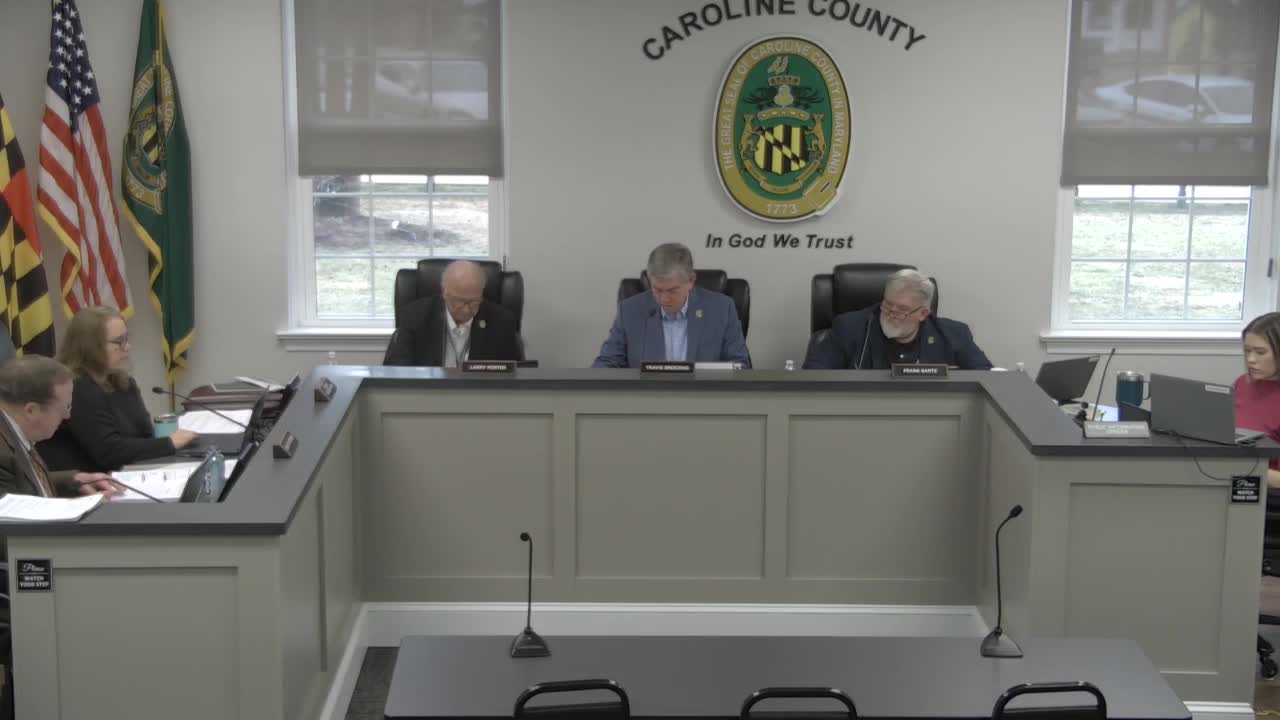Caroline County moves to intervene in two solar projects, warns state preemption bill could limit local control
Get AI-powered insights, summaries, and transcripts
Subscribe
Summary
County attorneys and commissioners said they have intervened in a Chaberton solar certificate application and prepared to intervene in a Halo project; they said state agencies and pending legislation are reducing local planning and taxing authority for utility‑scale solar.
Caroline County commissioners and the county attorney’s office said Tuesday they have intervened in a certificate of public convenience and necessity (CPCN) application for a solar project near Federalsburg and are preparing to intervene in a second, nearby project, while warning that pending state legislation could remove local land‑use and tax authority for utility‑scale solar.
County Attorney Stuart Barrow told commissioners the county received a roughly 200‑page application from Chaberton Solar Pahar LLC and “pointed out in a filing to the public utility law judge that the application is not complete.” Barrow said the Department of Natural Resources’ Power Plant Research Program (PPRP) filed that the application was complete, and a public utility law judge subsequently set the matter to proceed. “The application is in this binder. It's about 200 pages. I have read it,” Barrow said, describing the county’s next steps: written interrogatories to the applicant, preparation of written testimony from county staff and outside counsel and participation in two forthcoming public hearings (one virtual, one in‑person) before the Public Service Commission process.
Barrow and outside counsel Jesse Hammock (Easton) said the county contends the Chaberton application proposes siting in a zoning district that does not allow utility‑scale solar and that the applicant misrepresented its contact with county planning staff. The commissioners invited options for county commissioners to sit alongside the public utility law judge during in‑person hearings to observe hearings and hear applicant and intervenor testimony.
County staff also described a second project called Halo, on about 40 acres north of Goldsboro. Planning staff told the commissioners the Halo plan “meets all of our county code requirements, as far as solar siting with the exception of the recent changing to the 200 foot setback.” Commissioners said that if a project meets the county code and remains under the county’s 2,000‑acre cap, the county would likely not oppose it, but they emphasized the county will intervene in projects that conflict with zoning or code provisions.
Public comment at the meeting included a resident who urged that solar be directed to marginal land and away from irrigated farmland. “I was very glad to see that the old landfill will be used for solar,” a resident identified as Chip said, adding that large industrial solar installations on otherwise productive farmland are “upsetting.”
Commissioners and staff framed the county’s legal position as constrained by state review and a Public Service Commission process: if the PSC grants a CPCN for a project, that approval can effectively override county zoning for that specific project. Commissioners repeatedly cited a 2017 local ordinance that caps utility‑scale solar at 2,000 acres and noted enforcement of setbacks adopted by the county (200 feet) may be subject to review by a public utility law judge during CPCN proceedings. Barrow pointed to past court precedent—in the discussion he referenced Washington County litigation—as part of the legal background constraining county control.
The board also warned of pending state legislation they said could preempt local siting authority and reduce tax revenue. Commissioners described Senate Bill 931 (filed this session, cited at the meeting by number) as proposed legislation that would limit county zoning and setback authority for ground‑mounted solar, open the door to wider battery energy storage siting, and cap taxing authority for solar projects. Commissioners said the bill would, as drafted in committee materials they reviewed, reduce the county’s assessed tax base on solar generation equipment from about $9,370 per megawatt under local practice to a maximum of $5,000 per megawatt under the proposed statute; they also said the bill would permit salvage‑value assumptions to be used in calculating decommissioning obligations. Commissioners described those changes as a significant reduction to local taxing power and said several state agencies (DNR/PPRP and the PSC) are increasingly involved in the review process.
What happened next: the county attorney and staff said they have filed to intervene in the Chaberton matter, are preparing interrogatories and written testimony, and will file a petition to intervene in the Halo proceeding. The county said it will continue to coordinate with outside counsel and discuss whether county commissioners should attend the in‑person public hearing with the public utility law judge.
Ending: Commissioners said that, regardless of whether the county’s regulations are ultimately honored in a particular CPCN, the county will continue to intervene where it contends applicants have not complied with county code or the required application procedures and will monitor state legislation that could further restrict local control.
